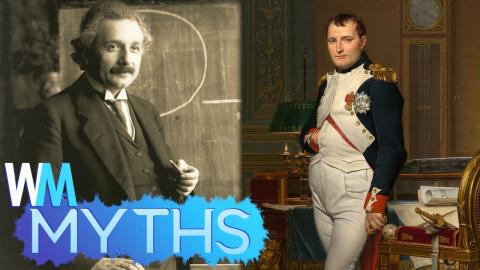Top 5 Myths About Historical Icons

Someone's got to stand up for these icons, what with them being dead and all.
Welcome to WatchMojo's Top 5 Myths, the series that finds the biggest myths people actually believe, and dispels them one by one. In this installment, we'll be looking at the 5 Myths About Historical Icons that had us burning our textbooks.
We won't be covering any historical icons from America, however, as we'll be saving the truth behind those stories for another list.
Watch on Our YouTube Channel: https://www.youtube.com/watch?v=2Q8PP-LX3OE
#5: Napoleon was short
People often use the term "Napoleon Complex," when talking about someone short and aggressive!
This, of course, derives its meaning from this legendary French emperor and general, Napoleon Bonaparte.
The myth may be associated with this military genius, but the reality of Napoleon's height was actually 5'6, a perfectly average number which was likely lost in translation between the French and English units of measurement during Napoleon's time in power.
Another idea historians have is that the British perpetuated this myth as anti-Napoleon propaganda.
Add to this the fact that Bonaparte tended to surround himself with a personal guard of tall soldiers, and the fact that he possessed a legendary temper, and you might have a number of other reasons why this myth has been perpetuated for so many years.
#4: Emperor Nero fiddled while Rome burned
Depending on who you ask, the reign of Emperor Nero from 54 to 68 A.D. was a nasty one, marked by tyranny, violence and corruption.
After all, we're talking about a ruler who reportedly murdered his own mother during his rise to power. There is one dastardly deed of which Emperor Nero cannot be saddled, however, and it's the one everyone remembers: his reported fiddling while Rome burned.
Beside the fact that the fiddle wouldn't be invented until hundreds of years after Nero's reign, the truth behind this tall tale is that he wasn't even present in Rome when the flames started.
Although there are certain historians who have chronicled that the Emperor might have sung during the great fire of 64 A.D., Nero actually assisted in fighting the blaze upon his return to Rome, and he even opened his palace gardens to those displaced in the chaos –
so he wasn’t all that bad…well he was but still.
#3: Catherine the Great of Russia died while having sex with a horse
This nasty rumor that Catherine the Great of Russia expired while engaged in equine coitus was likely spread after Catherine's death by her enemies, including possibly her brother, with whom she had a strained and difficult relationship.
She more than likely died from a stroke, although this mean spirited rumor was probably started largely due to Catherine's well-documented love life and extramarital affairs during the years prior to the 1762 coup – which, of course, led to Prussian-born Catherine ascending to Russia's throne as her sole ruler.
Other rumors of her death, such as the one which claimed that Catherine had perished while sitting on a toilet, failed to take root, but this one, for some reason or another, lives still as one of history's great myths.
#2: Marie Antoinette was famous for saying, "let them eat cake."
The phrase "let them eat cake" is often attributed to French ruler Marie Antoinette to describe her indifference and ignorance to the plight of her poor. Surprise, surprise, there is actually no evidence that Marie Antoinette ever said such a thing in the years prior to the French Revolution.
The truth behind this myth is that, despite living a lavish lifestyle, Marie Antoinette was, by all accounts, a fairly generous person with regards to her charitable donations, and didn't harbor the ruthless disregard towards France's poor as the myth implies.
Instead, the phrase is thought to have been popularized by the philosopher Jean-Jacques Rousseau in 1766, when the young Marie Antoinette was only ten years old.
It's believed that Rousseau's attributing of the phrase "la croute de pate," or "the crust of the bread" to "a great princess" was instead intended towards former monarch Marie-Therese, yet it's Marie Antoinette who continually receives the credit.
#1: Albert Einstein wasn't good at math
The internet’s full of those little tidbits of misinformation, that have you believing you could be as successful as some of history’s greats!
You've likely stumbled upon the idea that this particular genius wasn't good at math.
The truth is that Einstein actually excelled at mathematics from an early age, although he clashed sharply with educators and dropped out of school in Munich, Germany when he was fifteen.
The real roots behind this myth emerge from the fact that Einstein failed his entrance exam to a Swiss Polytechnic school his first time round in 1895.
The sixteen year old Einstein passed the exam's math section, but failed out of botany, language and zoology before finally being accepted into school the next year.
So sorry to say, Timothy, but you DO have to do your math homework – and you better do it well.
So which of these myths did you believe? Here’s what Google searchers are asking about historical icons: Did Einstein have a twin brother? Did Napoleon do good things? did Catherine the great freed the serfs??. For more fiddle fiddling top tens and horseplay top fives, please subscribe to WatchMojo.com!
